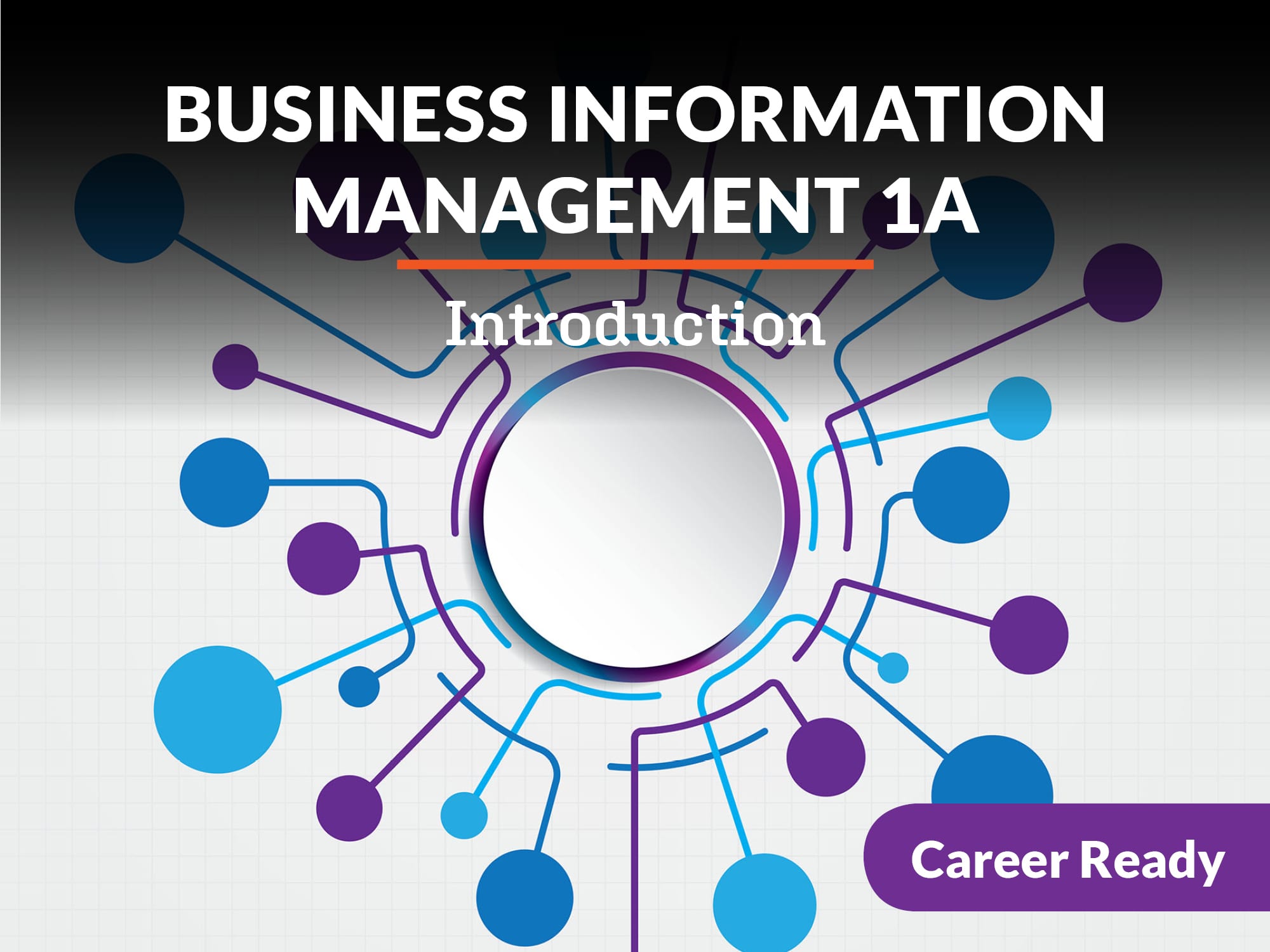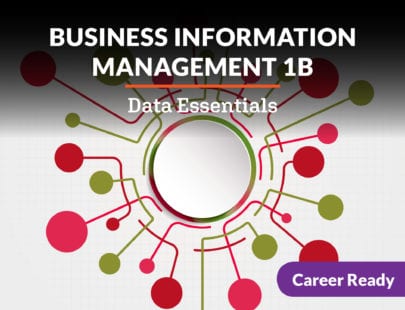
Business Information Management 1a: Introduction
Do you dream of owning your own business someday, or working for a company in a leadership position? Wherever your path may lead you, having the essential knowledge of business types, requirements to start a business, understanding of finances, business law, marketing, sales, customer service, and more, will ensure you’re on the path to success. Let’s explore your passion for business in this course!
Units at a Glance
Unit 1: The Basics of Business
The phrase ‘running a business’ makes something incredibly complex sound very simple. A good business needs dozens of elements to work together in order to be successful. Understanding the way a company’s structure is set up can give you a lot of information about the business itself. It’s a key skill for anyone who hopes to work for, or even start, a company in the future. In other words, almost everyone can benefit from learning about this topic.
What will you learn in this unit?
- Create and understand business plans and explain why they are so important
- Explain the different functions required to operate a business
- Recognize the importance of information and communication technology in a business context
- Distinguish different types of businesses and understand what’s needed to start one
Unit 2: The Finances of Business
Financial planning is crucial when it comes to running your own business. If you want your business to make a profit, then being able to grasp ideas like running costs, expenses, and margins is key. It may all sound a little complicated, but it is pretty logical when you get down to it. We’ll start with covering the basics of accounting, as well as how to budget. Once you’ve mastered the basics, you can begin to think strategically and consider how you might benefit from the financial products on offer to a business owner. You might think that finances are a little tedious, but by the end of this unit, hopefully you’ll see that no business can succeed without a strong understanding of its finances.
What will you learn in this unit?
- Describe and understand the accounting cycle
- Outline and understand a business risk assessment
- Investigate business costs and how to budget for them
- Evaluate different types of business insurance products and when they should be used
- Differentiate between types of financial institutions and the products they can offer
Unit 3: Marketing and Sales
Can you imagine what would happen if a business couldn’t sell anything? They wouldn’t be around for very long, that’s for sure. What helps a business the most is making sales, and in this unit we’ll cover not only why they are so important but how you can use marketing to help increase the number of sales a business makes in the first place.
What will you learn in this unit?
- Assess how marketing fits into the business plan
- Demonstrate your knowledge of market research, including demographics and targeted marketing
- Differentiate different marketing tools and classify the pros and cons of each
- Identify opportunities for innovation in marketing
- Explain the impact of sales as a part of business
Unit 4: Ethics and Business Law
No one wants to end up breaking the law, especially in business. Nevertheless, it can be very easy to do if you aren’t familiar with the laws and regulations that business owners must abide by. Thankfully, there is a lot of useful information available, and this unit will provide some guidance, not only on how to remain compliant with the law but also on how to run a business ethically to ensure you’re taking proper care of your employees. Businesses that function ethically have happier, more productive employees, and in return you as a business owner may well see larger profits.
What will you learn in this unit?
- Analyze the effects that different aspects of the law can have on a business
- Identify sources of business crimes and strategies that can be used to prevent them
- Describe the legal requirements for running a business, including employment and labor laws
- Discuss why a business should be run ethically and the benefits this has for employers and employees alike
- Investigate how the use of data and technology by a company and its employees can create legal problems for the company
Unit 5: Computer Hardware
For just about any business today, computers are essential. Whether they are used for emails, your company website, digital image editing, or even to store all of your customer information, computers form an integral part of the day-to-day functions of most companies. Therefore, it’s important to understand not only how computers work but also how to get the most out of them and to ensure their longevity through proper maintenance. Computers can also be used across a network to facilitate the fast trading of information and access to very complex applications. Understanding how computers communicate and how a basic network functions will ensure you know how to set up your computer network in the way that suits your company best.
What will you learn in this unit?
- Identify what hardware you need to begin your business
- Differentiate between several types of computer networks and explain what each is used for
- Compare the key uses of hardware and software
- Plan maintenance and upgrade tasks typically undertaken in a business environment.
- Investigate how to choose the right technology to fit a company’s needs
Unit 6: The Internet and Business
Just imagine what you could do if you had all of the world’s information at your disposal. It seems a bit like a fantasy. Surely you can’t get access to all of the knowledge that we have as a species. Perhaps not, but technology has brought us much, much closer to this through the use of the internet. There is so much information out there for us to discover that it’s become more and more important to understand how it all works. Throughout this unit, you will learn about the fundamentals of the internet and how it operates, how it can be accessed, the applications and tools used to make the most of it, and how to find and filter information effectively. The internet is different from many other types of networks, and being able to create content for it is key for a business in this day and age. Therefore, making the most of the internet is essential for anyone hoping to have their own company one day.
What will you learn in this unit?
- Discuss how the internet functions and compare this with other types of networks used in business
- Utilize internet terminology and the web to take advantage of what websites can do for business
- Create effective internet searches and define internet search modifiers
- Explain the advantages of using of web applications in business organizations
- Investigate ways to create the most effective internet searches
Unit 7: Web Design and Business
Online business is a very lucrative way of earning income for a business, but it requires a well-thought-out site with good content and eye-catching presentation to invite customers to visit and keep coming back. Understanding how to properly plan and implement a site, including utilizing features and graphics, is key and can be the difference between a successful site versus one that drives customers away. You should be encouraged to know that there are great resources available, and with careful implementation even a first-time business owner can create a fantastic website!
What will you learn in this unit?
- Explain different types of websites and be able to identify which to use for a business
- Plan the creation of a website from its initial concept to the delivery of the final product
- Select appropriate web editors and coding languages to build and enhance a website
- Demonstrate understanding of website design including color theory
- Evaluate the effectiveness of graphics and animations in grabbing the attention of visitors to a website
Unit 8: Operating Systems and File Management
It’s easy to underestimate the crucial role that an operating system plays in our computer. Whether you’re installing software like browsers or word processors, or even your favorite PC game, none of that would be possible without an OS. There are several different operating systems, each of which comes in different versions, but they all fulfill the same function: they provide the foundation on which the software we use on a daily basis is built. Without an OS, you wouldn’t be able to open Gmail to read your email or run Word to complete that proposal you’re writing to get your startup company going.
What will you learn in this unit?
- Describe the history and use of operating systems
- Safely create and move files in an operating system
- Correctly and efficiently name files in accordance with best practices used in business
- Safely store files while preventing data loss by creating backups
- Transfer, download, and save data to satisfy business standards
Required Materials
Physical
- Sheets of plain paper, 8.5 x 11
Technical
- Chrome, Edge, or Firefox internet browser.
- Word Processing software (optional)
- PDF Reader software (like Adobe Acrobat)
- Dropbox or Windows Explorer (for creating folders and files)




